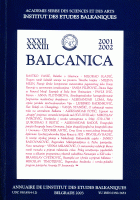Ugovori na "drugim" jezicima i osmanski šerijatski sud (XVI–XVIII vek)
The Contracts in "Other" Languages and Ottoman Shari’ah Court (16th– 18th c)
Author(s): Aleksandar FotićSubject(s): History
Published by: Balkanološki institut - Srpska akademija nauka i umetnosti
Keywords: Shari’ah court; contracts; documents;
Summary/Abstract: Between the 16th and 18th centuries, as subsiquently as well, non-Muslim subjects of the Ottoman Empire used as lawfull proof in the Shari’ah court various documents, contracts, written in non-Ottoman languages. What is particularly worth emphasizing, is the fact that these contemporary documents, written in Cyrillic script and in the Serbian/Bulgarian language, as well as those in the Greek language, not rarely involved even Muslim and non-Muslim subjects. Even very important ones: concerning payment of debts and giving land as security. On the basis of few hüccets preserved at Hilandar it has been shown that such documents were indeed acknowledged by the Ottoman Shari’ah courts, and as reliable and valid evidence. The hüccets refer to them as mōloviya/mōlōyia (ﻪﻴﻮﻠﻮﻣ) – undoubtedly derived from the Greek term omologia (όμολογία) – regardless of whether a document was in Greek or in some of the Slavic languages. Writing omologias in mixed milieus, with predominantly Christian population, shows that Muslim community sometimes accepted local customs and traditions of the zimmīs. They were influenced by local customs although there was open and more secure opportunity to register loans at kādī’s Shari’ah court.
Journal: BALCANICA
- Issue Year: 2001
- Issue No: 32+33
- Page Range: 175-183
- Page Count: 8
- Language: Serbian

